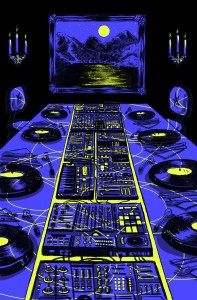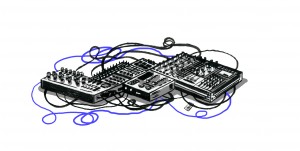Luke McKeehan is certainly no stranger to Vancouver’s volatile music scene. As the owner and creator of Nordic Trax, an independent house music label based out of Vancouver, Luke has managed to create his own brand of house music that expands beyond our 49th parallel. Nordic Trax was created back in 1997 and has since put out over 80 releases, featuring a cross-continental lineup that spans from Canada to Europe. The label also throws shows at various venues in the city that are frankly, some of the best places to shamelessly dance your ass off. Luke has consistently upheld his beliefs and has maintained a successful, independent label for eighteen years, a feat that is impressive by any standards.
“I’m lucky enough to have survived the music industry and all of its trials and tribulations. So now in terms of my future goals, I’m focusing more and more down on what I’m into and not being involved with stuff that I don’t really dig. And that’s a nice privilege to have.”
Born and raised in the heart of Toronto, Luke’s interest in house music grew out of his surroundings. The Toronto club scene in the eighties was a breeding ground for house and rap music, and those genres stuck with Luke into his adulthood. While attending Queens University Luke worked as a DJ, finally ending up in Vancouver after a year as a ski bum in Whistler.
Luke’s initial involvement in Vancouver’s house scene was through partnerships with two musically-focused clubs that were popular in the late 90s and early 2000s, Sonar and Chameleon. These clubs cornered the market for live music and dj sets, offering underground dj programming on the weekends— a concept that, at the time, was foreign to Vancouver with most club owners keeping weekend nights for themselves and only letting indie promoters fight for weekday scraps. Vancouver became a blank canvas for club promoters and house music was the ideal medium.
“A lot of people producing music in Vancouver in the mid to late 90s were actually people from the East Coast who just saw the opportunity here. Toronto and Montreal had bumping club scenes and it just wasn’t quite happening here on that level. It wasn’t that people weren’t up for it— it was just that the club owners were kind of conservative. But some of us saw it as an opportunity, like why aren’t people doing this?”
House music has evolved rapidly and significantly over time. Particularly with the advancement of technology, the barriers to entry for those seeking to make music are lower than ever. Contemporary house music encompasses a very broad range of sub-genres, some of which are less than sophisticated. The throngs of teens who go nuts over Calvin Harris and the absolute insanity of mainstream EDM festivals like Tomorrowland or Veld have diluted house music’s overall cultivation. Whether or not this is beneficial for an old-school, independent label like Nordic Trax remains an area of contention.
“Since the disco era, there haven’t been this many people in the general public listening to dance music. And that’s an ongoing argument— is this an entry level or is this bad for the scene? You’ll only know after the fact, when the EDM wave is dead and considered unfashionable by the very people who embraced it, whether it really did trickle down or whether it confused things and ended up getting more people involved in the cheesy side of it.”
Corporate control in the music industry is one of the biggest challenges facing artists and producers in the modern day. ‘Coca-Cola Syndrome’ gave a nice slap in the face to the industry, and with the rising age of file sharing and higher ticket prices, the difficulties independent labels face in order to survive corporate takeover have exacerbated. Luke credits his success to his long-standing and positive relationships with venues and producers in the city.

“Music was the first of the media to get slaughtered by the internet. Thankfully dance music was already selling on the internet and adapting to technology, and we still sold vinyl. So we didn’t get killed as quickly as mainstream music at the start, when, say, Napster came along… That changed what the consumer got to hear because it was being driven by a bunch of guys in suits in boardrooms in Beverly Hills, literally.”
Luke’s business model is based around making sophisticated house music for a niche market. What he likes, he makes. “Resisting corporate greed— everyone has to be presented with that. You can work with these big companies, but to what level? How much of our scene do they have to own? That is difficult, trying to balance the art and the business side… Why do you think so much pop music is still marketed with total tits and ass? I don’t need a girl in a bikini to promote my song. But for some other people in the music business, successful people in the music business, no less, that’s the absolute way you do it. You do it that way, and then you spend a million dollars marketing that you just did it that way.”
Nordic Trax offers a handful of their releases on vinyl, but the majority of their sales are through digital formats. The label employs freelancers from around the world, and Luke now spends a portion of his time in Valencia, Spain, allowing Nordic Trax to tap into the large European house music scene.
X
Nordic Trax’s next show will feature Chicago DJ Mark Farina at the Imperial on October 23.


